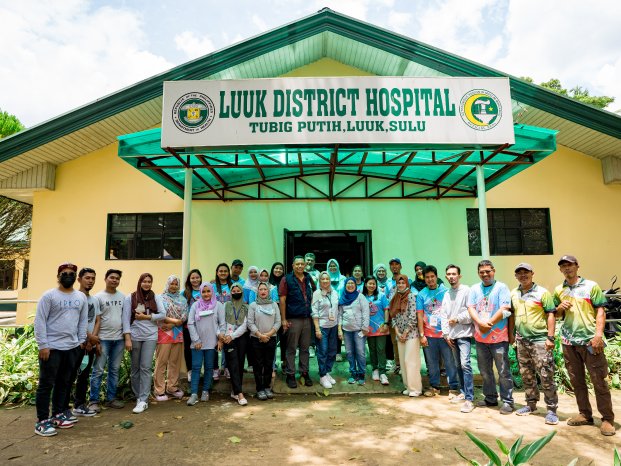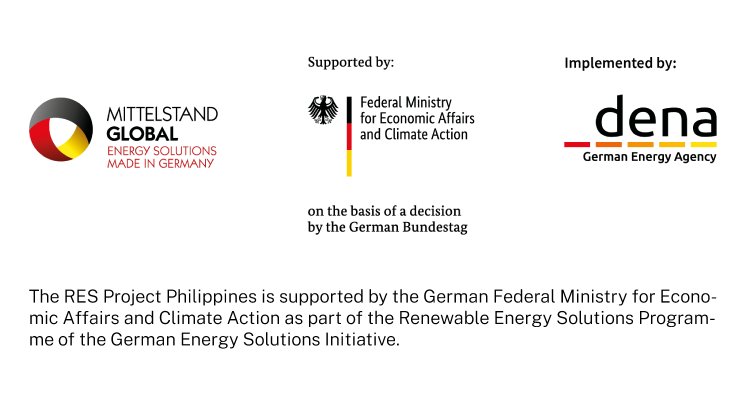The importance of electrification in disaster-prone areas
The Philippines, a nation comprising over 7,600 islands, is frequently subjected to natural disasters including typhoons, earthquakes, and tropical storms. In such difficult times, rural healthcare facilities serve dual purposes: providing medical care and acting as emergency shelters. The need for reliable, sustainable electricity in these facilities is therefore doubly important.
Current Efforts: Providing Immediate Relief and Stability
As of today, BOS has successfully implemented its advanced energy solutions in eight healthcare facilities situated in the rural southern regions of the Philippines. These facilities include Parang Hospital, Indanan Rural Health Unit (RHU), Tandubas RHU, Tabawan RHU, Caluang RHU, Tuburan RHU, Al-Barka RHU, and Luuk Hospital. Together, these installations have added 450 kWh of lithium capacity and 220 kWp of photovoltaic modules to the Philippine healthcare infrastructure.
„Our current activities focus on solving immediate energy challenges,“ states Benjamin Seckinger, CEO of BOS Balance of Storage Systems. „Through this initiative, we are ensuring that essential healthcare services are not disrupted due to lack of reliable electricity, particularly in regions that are vulnerable to natural disasters.“
A Blueprint for future electrification projects
The impact of BOS‘ solar island system has been significant, notably at Luuk Municipal Hospital. At the energy seminar in Manila Dr. Jodl Isahac, the Hospitals Admin Head, describes the improvements since the systems installation: „The affordable and reliable energy provided by the new solar system has greatly improved the services our hospital provides. As a result, our bed occupancy rate has increased from 70% to 85% and continues to rise. We have also become more attractive to employees.“
Benjamin Seckinger, CEO at BOS, comments, „The success of the Solar Island Systems implemented in these eight hospitals is encouraging. They serve as a potential model for a scalable, sustainable healthcare system. Looking at the success of our modular energy systems, it is clear that our approach, has the potential to bring positive change to hospitals and other community-serving facilities. “
Strategic Partnerships to enhance Healthcare accessability
BOS is looking forward to explore further opportunities in the Philippines to enhance not just healthcare facilities but potentially other community-serving institutions like schools. The focus is on continuing the conversations and business opportunities presented at the recent energy seminar organized by BOS in Manila, and building new business partnerships that will shape the development of offgrid power in the Philippines.
Sean LePoidevin, Regional Manager Australia and Pacific, remarks: „We‘re enthusiastic about the new avenues opening up, including the promising conversations from the energy seminar. As we look to what lies ahead, we‘re focused on dialogue, collaboration, and the possibility of expanding our efforts to create a more sustainable energy infrastructure.“
The RES Project Philippines is supported by the German Federal Ministry for Economic Affairs and Climate Action as part of the Renewable Energy Solutions Programme of the German Energy Solutions Initiative.
German Energy Agency (dena)
The German Energy Agency (dena) is a centre of excellence for the applied energy transition and climate protection. dena studies the challenges of building a climate- neutral society and supports the German government in achieving its energy and climate policy objectives. Since its foundation in 2000, dena has worked to develop and implement solutions and bring together national and international partners from politics, industry, the scientific community and all parts of society. dena is a project enterprise and a public company owned by the German federal government. dena’s shareholder is the Federal Republic of Germany.
www.dena.de/en
German Energy Solutions Initiative
With the aim of positioning German technologies and know-how worldwide, the German Energy Solutions Initiative of the Federal Ministry of Economics and Climate Action (BMWK) supports suppliers of climate-friendly energy solutions in opening up foreign markets. The focus lies on renewable energies, energy efficiency, smart grids and storage, as well as technologies such as power-to-gas and fuel cells. Aimed in particular at small and medium-sized enterprises, the German Energy Solutions Initiative supports participants through measures to prepare market entry as well as to prospect, develop and secure new markets.
www.german-energy-solutions.de/...
Renewable Energy Solutions Programme (RES Programme)
With the RES programme, the German Energy Solutions Initiative of the Federal Ministry of Economics and Climate Action (BMWK) helps German companies in the renewable energy and energy efficiency sectors enter new markets. Within the framework of the programme, reference plants are installed and marketed with the support of the German Energy Agency (dena). Information and training activities help ensure a sustainable market entry and demonstrate the quality of climate-friendly technologies made in Germany.
https://www.german-energy-solutions.de/...




